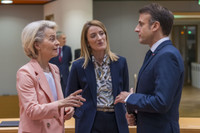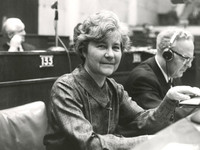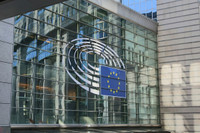
For our weekly “Ideas on Europe” editorial by UACES, the University Association for European Studies, we welcome Rebecca Zahn, from University of Strathclyde, in Glasgow.
Rebecca, you’re a law professor, and you’re interested in the social dimension of European Integration.
That’s right. I think we can learn a lot from the past when thinking about the future of Social Europe.
In research, we speak about an “asymmetry” underpinning Social Europe. This goes back to the 1957 European Economic Community Treaty, which reflected a consensus to rely on market forces for growth and wealth creation while social policy largely remained the preserve of the Member States. This “asymmetry” continues to hamper efforts at European social integration.
If we go further back in history then we see that earlier attempts at creating a European union foresaw exactly this problem. Aristide Briand’s Memorandum on the Organisation of a System of Federal European Union – the first (French) government-backed proposal for a ‘European Union’ – presented to the Assembly of the League of Nations in 1929 and published in 1930 aimed at the establishment of a common market. Briand recognised that a European union needed to lead to a permanent union of solidarity amongst European peoples in order to succeed.
Solidarity was understood in terms of creating a moral community whereby Europeans recognise the innate inter-connectedness of their situation and are able to trust that one state will act in the interests of all states and to be able to speak with one voice in times of crisis. Briand recognised that this moral community may come about organically, but realistically would need to be actively created.
Unfortunately, the time was not ripe yet for this kind of “Idea on Europe”.
Yes, other governments’ responses to the Memorandum were muted and, together with the deteriorating economic and political situation in Europe, this meant that the Memorandum was not further discussed by the League of Nations. But it was assigned to a new committee within the League’s framework – the “Commission of Inquiry for European Union”.
This is where it gets really interesting for European labour lawyers. The Commission received a Memorandum from the International Labour Organisation (ILO) in January 1931. The ILO’s Memorandum was written by its director – another Frenchman, Albert Thomas, who was in favour of social harmonisation. The key driving force behind his proposals was a conviction that future prosperity and peace on the continent required European states to give up parts of their sovereignty. Thomas was convinced that the constant respect for national sovereignties would obliterate any attempts at creating effective international organisations.
The Memorandum therefore, amongst other things, proposed a comprehensive, cross-border plan of public works which would tackle the main issue of the day – large-scale unemployment – while also encouraging European integration and European society building. The resulting transnational infrastructures would fulfil the same aims identified by Briand, namely mutual dependence which would give rise to solidarity and, ultimately, a European spirit.
These were visionaries of European integration!
Briand and Thomas’ plans have largely disappeared from European consciousness. Although similarities in thinking are evident in the 1950 Schuman declaration which spoke about the creation of solidarity, such considerations did not survive the many political compromises necessary to agree the EEC Treaty in 1957.
But today, the situation is different: the breakdown of national welfare state systems since the 2008 financial and economic crises, the rise of populism in a number of Member States, Brexit, and now the Covid-19 pandemic engender a sense of urgency into the debates on the future shape and form of the European Social Model.
So what can we learn from the past for the future of Social Europe?
Three points stand out.
First, Briand and Thomas recognised the importance of solidarity as an underlying principle of integration. European citizens need to feel part of a moral community.
Second, a sense of solidarity or moral community will not come about organically but needs to be created through concrete actions.
Finally, in order for a European Union to be able to take such concrete actions which build solidarity, Member States need to reassess the distribution of competences in the social sphere between the national and EU level. There is hope that the current pandemic creates the necessary momentum to achieve political consensus in this regard.
Thank you very much Rebecca. Needless to say that at Euradio, we strongly believe in this kind of European solidarity. Did you know that Aristide Briand was born and grew up in Nantes and Saint-Nazaire?
Next week, we’ll have the pleasure to welcome Daniele Albertazzi, from the University of Surrey.





